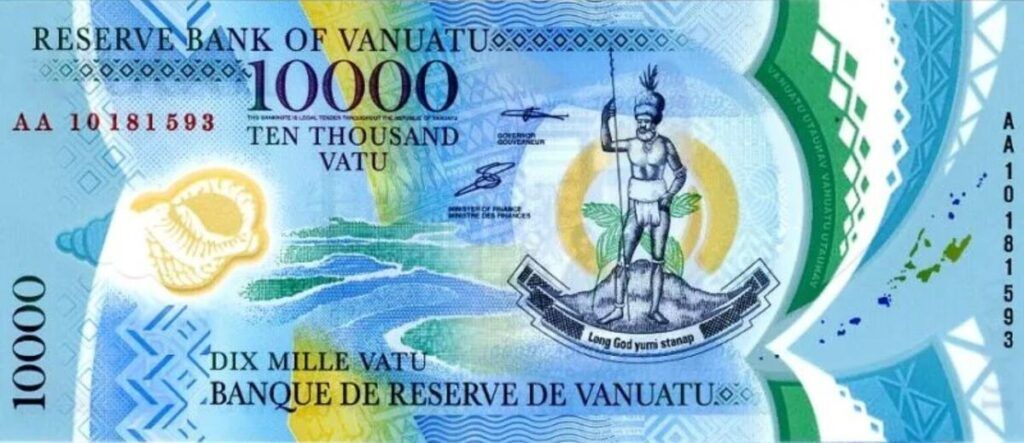When traveling to the beautiful South Pacific nation of Vanuatu, understanding the local currency is essential for any visitor. The vatu (VUV) is the official currency of Vanuatu, featuring the unique characteristic of having no subdivisions – unlike dollars with cents or pounds with pence. The Vanuatu vatu is represented by the symbol VT and carries the international currency code VUV (numeric code: 548).
Currency exchange is straightforward for international travelers visiting this island paradise. Many tourists typically exchange US dollars (USD) to vatu, as this is one of the most common currency pairings.
Get a discount of 15% to 70% on accommodation in Vanuatu! Look for deals here:
Vanuatu Hotels, Apartments, B&Bs
Western Union and other exchange services make it easy to convert major currencies to VUV, ensuring visitors can enjoy local markets and experiences with the proper currency in hand.
Vanuatu Vatu: Currency Overview
The Vanuatu vatu (VUV) serves as the official currency of Vanuatu, a South Pacific island nation. This currency has no subdivisions and uses the symbol VT for financial transactions throughout the archipelago.
History and Significance
The vatu was introduced in 1982 following Vanuatu’s independence from the joint British-French colonial administration known as the New Hebrides. Before the vatu, the country used a complex system involving both the Australian dollar and French franc.
The name “vatu” holds cultural significance, as it means “stone” in many of Vanuatu’s local languages. This name references traditional stone money that once held value in Pacific island cultures.
The currency plays a vital role in Vanuatu’s developing economy. With the ISO code VUV and numeric code 548, the vatu has become an established part of the international monetary system despite being one of the lesser-traded currencies globally.
Coins and Banknotes Design
Vanuatu’s currency features both coins and banknotes with distinctive designs reflecting the nation’s cultural heritage and natural environment. The current coins come in denominations of 1, 2, 5, 10, 20, 50, and 100 vatu.
Coin designs showcase marine life, local flora, and traditional items like the ceremonial pig tusks that hold cultural importance in Vanuatu. Most coins have a round shape, though some special editions feature unique formats.
Banknotes circulate in denominations of 200, 500, 1000, 2000, 5000, and 10,000 vatu. These colorful notes display important cultural symbols, local landscapes, and portraits of significant figures in Vanuatu’s history. Security features include watermarks, security threads, and special printing techniques to prevent counterfeiting.
The Reserve Bank of Vanuatu manages and issues all official currency, controlling monetary policy and currency exchange rates.
Currency Exchange and Remittance
Exchanging currency in Vanuatu involves understanding exchange rates and finding reliable services. Visitors and residents need to know how to get the best rates and avoid fraud when converting money or sending remittances.
Understanding Exchange Rates
The Vanuatu Vatu (VUV) is the national currency, and its exchange rate fluctuates against major currencies. As of March 28, 2025, exchange rates are updated daily by banks and currency services.
Most common currency conversions include:
- USD to VUV: Americans visiting Vanuatu often convert dollars
- AUD to VUV: Australian dollars are widely accepted due to close economic ties
- EUR, GBP, JPY, NZD to VUV: These currencies can also be exchanged at banks and hotels
The National Bank of Vanuatu offers a currency converter for various currencies including AUD, EUR, FJD, and others. Exchange rates differ between telegraphic transfers and physical notes, with the latter typically offering less favorable rates.
Tourism areas may accept USD and AUD directly, but often at less favorable rates than official exchanges.
Money Transfer Services
Several options exist for sending money to Vanuatu or converting currency within the country.
Western Union maintains a strong presence in Vanuatu, allowing people to send and receive international transfers quickly. Recipients can collect money in VUV even when sent in other currencies.
Other transfer services include:
- Bank-to-bank international transfers
- Mobile money services
- Post office remittance services
Transfer fees vary significantly between services. Banks often charge higher fees but provide more security. Money transfer companies might offer better exchange rates but may have limited locations.
For residents sending money abroad, the process requires proper identification to comply with anti-money laundering regulations.
Anti-Fraud Measures in Currency Exchange
Vanuatu has strengthened its financial security to protect currency exchange and transfers from fraud.
Key protective measures include:
- Advanced encryption for digital transfers
- ID verification requirements for all transactions above certain amounts
- Transaction monitoring systems to detect suspicious patterns
Tourists should avoid street money changers who may use counterfeit currency or manipulate calculations. Official exchange services follow strict protocols to ensure legitimate transactions.
Banks provide additional security features like SMS notifications for currency exchanges and transfers. These alerts help customers quickly identify unauthorized activity.
The government regularly updates regulations to address new fraud techniques and protect the integrity of Vanuatu’s financial system.
Get a discount of 15% to 70% on accommodation in Vanuatu! Look for deals here:
Vanuatu Hotels, Apartments, B&Bs
















